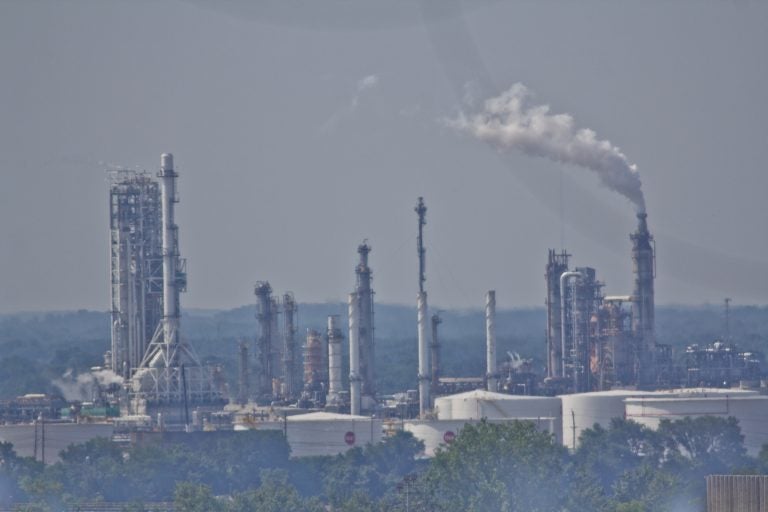PGW seeks approval for $60 million liquefied natural gas plant in Southwest Philadelphia
The $60 million project could produce 120,000 gallons of liquified natural gas a day.

A Philadelphia refinery (Kimberly Paynter/WHYY)
The city-owned gas company Philadelphia Gas Works is proposing a new liquefied natural gas facility in Southwest Philadelphia that could provide $4 million of revenue for 25 years.
The project is a public-private partnership with Passyunk Energy Center, LLC — an entity established by Liberty Energy Trust GP, LLC, an energy company based in Conshohocken — that will bear all the costs and responsibility for building the new liquefaction and truck loading facilities. It will then market and sell the liquefied natural gas produced by PGW.
“So there’s no financial risk upfront, no commercial commitment upfront for PGW and we get paid because we are providing the expertise and the services to run liquefaction and truck loading facilities,” said PGW spokesman, Barry O’Sullivan. “And if the partner is successful in selling liquefied natural gas to customers outside Philadelphia, then we share the revenue. But we’re not dependent upon that revenue for our income because we are not paying any money out upfront.”
The project was presented for review to the Philadelphia Gas Commission on Thursday. City Councilman Derek S. Green, chairman of the commission, said the project presents no economic risk for the city or customers.
“Under this proposal we receive a guarantee payment of $4 million no matter what, that was part of the negotiation process between PGW and Liberty [Energy Trust],” Green said. “This will benefit city and customers because we will be receiving $4 million per year, that is not coming from customers paying an increase in their gas bill.”
PGW has been trying to expand its liquefied natural gas assets for years. The gas company currently liquefies natural gas in its Port Richmond facility and stores it in its Passyunk plant. The proposal will allow the company to increase its liquefaction capacity and avoid transporting it from one plant to another.
Cooling natural gas to a liquid state allows its transportation and storage. By storing natural gas in the summer, when there’s little gas demand, PGW can meet peak demand during the winter, when consumers use a lot of gas. Known as LNG, it’s also used to fuel ships, trucks and buses.
Christina Simeone, director of policy and external affairs at the University of Pennsylvania’s Kleinman Center for Energy Policy, said it’s in the best interest of gas customers for PGW to explore this alternative revenue stream. Gas use is declining as a result of the efficient supply of natural gas, she said, and there aren’t many ways for PGW to generate additional revenues to defer the costs and safety upgrades the system requires.
“By generating this additional revenue, it could avoid the need to raise more money from ratepayers to pay for the costs of maintaining the distribution system,” said Simeone, author of a 2016 report that explores risks and benefits of the gas company’s efforts to expand its LNG production.
It sounds like a good deal. But even though the new facility is smaller than a previous one proposed in PWG’s Port Richmond plant, environmentalists fear it could bring extra health, safety and pollution burdens to South Philadelphia.
“We are very concerned about the broad environmental impacts, the public safety impacts, because of the transportation of the LNG and the actual processing, and then the pollution that would be released by the plant,” said Tracy Carluccio, deputy director of the Delaware Riverkeeper Network.
PGW said air emissions from the project will be minimal and that the project will not require a new gas pipeline. The facility will take up less than 2 acres of its 29-acre Passyunk plant.
Green said the new facility won’t increase truck traffic to the plant — the company won’t be driving trucks from the Port Richmond plant to the Passyunk plant. The extra revenue, he said, could give the city the opportunity to explore other types of alternative energy solutions that can’t now be funded with ratepayer money.
The $60 million project could produce 120,000 gallons of LNG a day.
WHYY is your source for fact-based, in-depth journalism and information. As a nonprofit organization, we rely on financial support from readers like you. Please give today.





